NIL
Coach Johnny Jones Sheds Light On HBCU Basketball’s Biggest Challenges
HOUSTON — The landscape of college basketball continues to evolve and shift for HBCUs, which continue to spiral from the effects of NILs. HBCU Legends spoke with Texas Southern head basketball coach Johnny Jones about the decreasing opportunities for HBCU basketball players hoping to “shoot their shots” at an NBA career. “I think the hard […]
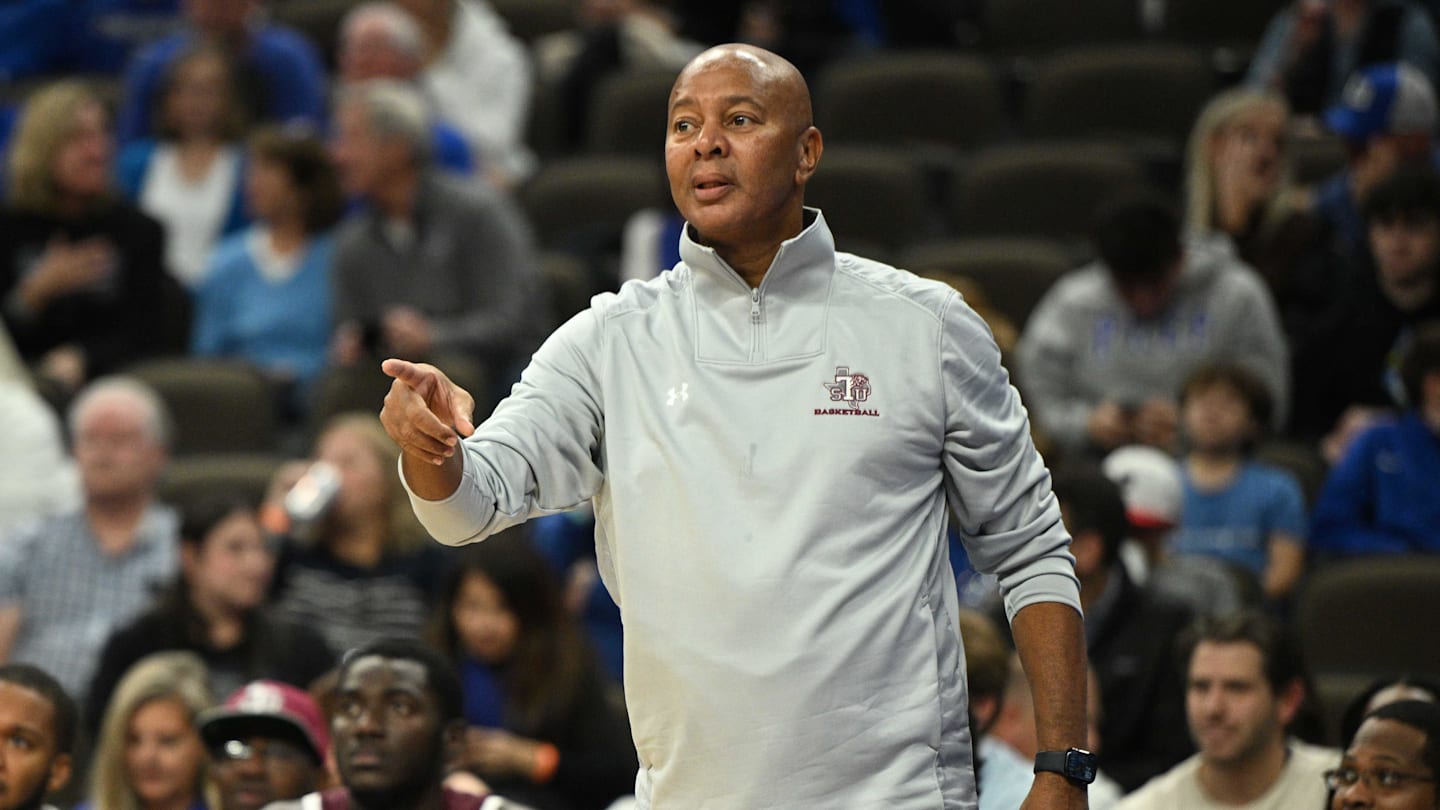
HOUSTON — The landscape of college basketball continues to evolve and shift for HBCUs, which continue to spiral from the effects of NILs. HBCU Legends spoke with Texas Southern head basketball coach Johnny Jones about the decreasing opportunities for HBCU basketball players hoping to “shoot their shots” at an NBA career.
“I think the hard part is finding that “diamond in the rough” like you used to,” Coach Johnny Jones said. “Before the days of, I guess, with the social media and all the camps and everything that’s ongoing, there may have been someone there that you could get that could really blossom as a freshman that people may not have seen or heard about, and then they could put themselves in position to possibly be considered even for the draft.”
It’s been more than a decade since an HBCU player (Kyle O’Quinn in 2012) heard their name called in the NBA draft. Coach Jones noted that opportunities for discovery have diminished despite Travis Williams’ efforts to showcase HBCU basketball talent over the past four years at the HBCU All-Star Games.
With the mushrooming of scouting opportunities, camps, and AAU circuits fueled by social media, most elite prospects are snatched early by power conference programs.
But recent years have seen even top Power 5 talent slip through the cracks, with Jones citing players like Alabama’s Sears and Arizona’s Love as high-profile examples who didn’t get drafted despite immense exposure. With just 60 spots in the NBA draft — and the increased focus on international pros — HBCU hopefuls face “even more difficulty,” Jones said.
“I just think it’s going to have to be one of those guys that come up and have an exceptional season and get a great deal of exposure from that season that they’re at the school because if they last, unfortunately, if they’re good enough, they certainly won’t be at the school for two years because you get that type of exposure because of the new age of NIL.”
The NBA’s widening global approach is yet another obstacle. Jones noted that international players often face a different development curve—many play professional-level basketball as teenagers, giving them an advantage in terms of maturity and skill.
“You had some guys opt not to even put their name in the draft this year because they have an opportunity to excel and do well at the colleges that they’re at, especially if it’s one that have the ability to take care of guys with the NIL that they have available to them now.” – Johnny Jones
With the lure of NIL deals, international players now even come stateside to play college basketball before hopping into the draft, squeezing an already bottlenecked pipeline even tighter for HBCU players.
NIL rules have revolutionized the college sports landscape, but for HBCUs, it’s a double-edged sword. Years ago, an athlete might have stayed and built a name and legendary career at one school. Today, if an HBCU player has a breakout year, it’s likely major programs with deeper NIL pockets will woo them.
One recent case study is Blake Harper at Howard University. Harper was a phenomenal player during his freshman season in 2024-25, making it almost impossible for the Bison to keep him in their locker room.
Creighton won the sweepstakes for his services, and Harper is headed to Nebraska.
“It’s extremely difficult,” Jones admitted, to keep top talent. Yet, he also sees these transfers as opportunities to showcase HBCU development success, which can help attract the next wave of recruits.
“Programs got to be proactive and I think at the same time be creative in a sense of what they can do to try and have the ability to have some type of NIL or collective, so to speak, at their representative at certain schools,” Coach Jones shared.
Coach Jones emphasizes that academics remain the priority for the student-athlete. The “main thing is still the main thing,” he noted. The percentages are low for most collegiate athletes to transition to the NBA as professionals. Thus, how are the coaches preparing their players for life after collegiate sports? Leveraging the surrounding community and networking.
“People come to Houston to make it their home. It’s not one of those places you pass through,” Jones stated.
Leveraging Houston’s rich network of professional athletes and business leaders, Texas Southern, for example, is committed to exposing students to real career possibilities—before and after their playing days.
Looking ahead to the 2025–26 season, Jones expresses optimism about his new recruits and returning players. Even as they fill gaps left by key losses and brace for a demanding non-conference schedule — including heavyweights like Gonzaga and Texas A&M — he believes the team’s chemistry and collective ethos will be a difference-maker.
“We couldn’t be happier. You know, a lot of times it’s hard and difficult to get high school kids, but when you get a kid on that level that is making that type of impact and in high school come from a very short high school program, had a teammate that was obviously being looked at a lot of coaches in their gym night in and night out. And LJ was one of those guys that did a tremendous job of holding his own in every game.”
The Texas Southern basketball staff’s commitment extends beyond the court to include professional development, with initiatives focused on social media branding, NIL education, and post-basketball career guidance.
It’s a complex tapestry of issues HBCU basketball faces. The fierce competition for talent and the lack of resources to remain competitive will always be a challenge for our HBCU student-athletes.
However, through ingenuity, visibility campaigns, and a relentless focus on education, HBCUs can remain a beacon for student-athletes with big dreams—on and off the basketball court.
JOIN OUR NEWSLETTER
What happens next in HBCU Sports? Don’t miss out on any HBCU news and analysis! Please take a second and sign up for our FREE newsletter and get breaking HBCU Sports news delivered to your inbox!
NIL
Donald Trump signs executive order banning ‘pay-for-play’ deals in college sports
President Donald Trump has signed an executive order related to college sports. The order has been long-rumored but was officially signed on Thursday afternoon. According to an official White House statement, the bill will restrict “pay-for-play” arrangements for student-athletes. However, the bill still allows for “legitimate, fair-market-value compensation” from third-parties. With student-athletes now able to […]

President Donald Trump has signed an executive order related to college sports.
The order has been long-rumored but was officially signed on Thursday afternoon. According to an official White House statement, the bill will restrict “pay-for-play” arrangements for student-athletes. However, the bill still allows for “legitimate, fair-market-value compensation” from third-parties.
With student-athletes now able to earn money from revenue-sharing as part of the House settlement agreement that was finalized earlier this year, attention has turned toward NIL agreements that have had very little oversight in recent years. NIL payments from collectives and other third-party institutions were expected to face increased scrutiny moving forward even prior to this executive order being signed. NIL deals worth more than $600 have to be approved by an NIL clearinghouse operated by Deloitte.
President Trump’s executive order also addressed women’s sports. Per the White House statement, the order “requires the preservation and, where possible, expansion of opportunities” in women’s and non-revenue sports. The statement also says the order will take steps to “protect” non-revenue and Olympic sports as it relates to revenue-sharing.
It remains to be seen whether this executive order will have a significant financial impact for college football players. Noted attorney Darren Heitner pointed out that “pay-for-play” deals have already been technically illegal since July 1, 2021.
Revenue-sharing for the 2024-25 season — not including external NIL agreements — is capped at approximately $20.5 million for each athletic department, per the terms of the House settlement. That number is expected to increase in future years.
Here is the full executive order obtained by Yahoo!’s Ross Dellenger:
Spenser is a news editor for Saturday Down South and covers college football across all Saturday Football brands.
NIL
Planet Fitness Named Official Fitness Center of WVU Athletics
Story Links MORGANTOWN, W.Va. – The West Virginia University Department of Intercollegiate Athletics announced today a multi-year partnership with Planet Fitness, one of the largest and fastest-growing franchisors and operators of fitness centers with more members than any other fitness brand, as the “Official Fitness Center of WVU Athletics.” The partnership, which […]

MORGANTOWN, W.Va. – The West Virginia University Department of Intercollegiate Athletics announced today a multi-year partnership with Planet Fitness, one of the largest and fastest-growing franchisors and operators of fitness centers with more members than any other fitness brand, as the “Official Fitness Center of WVU Athletics.”
The partnership, which includes the official designation and prominent, TV-visible signage at Mountaineer football, basketball and baseball games, was secured on behalf of West Virginia Athletics by athletics multimedia rightsholder Mountaineer Sports Properties, the locally based team of Learfield – the leading media and technology company powering college athletics.
“We’re proud to be the Official Fitness Center of WVU Athletics,” said Chelsea Halker, Field Marketing Manager at Planet Fitness. “We’ve been in West Virginia for over 10 years, and this moment really cements that. With 10 clubs and counting, we’re excited to get even closer to the fans and communities we already know and love.”
“We are thrilled to welcome Planet Fitness to our team as the Official Fitness Partner of WVU Athletics,” said Matt Wells, West Virginia University’s Deputy Director of Athletics for External Affairs. “By connecting passionate Mountaineers with convenient, community-centered wellness options, this designation goes beyond branding, it reflects a shared commitment to supporting health and access across West Virginia.”
As part of the partnership, Planet Fitness will launch a targeted social media lead generation campaign aimed at reaching Mountaineer fans across the state. Leveraging insights from Fanbase, the most comprehensive fan data infrastructure in college athletics, Mountaineer Sports Properties identified more than 113,000 fans within five miles and more than 163,000 within 10 miles of franchise locations. The multimedia rights team and the West Virginia Athletics staff will tap into demographic, geographic, and profile data metrics to better target Mountaineer fans and maximize brand partnership opportunities.
“By leveraging Fanbase, we were able to match Planet Fitness’ growth goals with precise fan data and localized strategy,” stated Evan Hawkins, General Manager of Mountaineer Sports Properties. “It’s a clear example of how data and creativity can come together to drive smarter partnerships in college athletics.”
About Planet Fitness
Founded in 1992 in Dover, NH, Planet Fitness is one of the largest and fastest-growing franchisors and operators of fitness centers in the world by number of members and locations. As of December 31, 2024, Planet Fitness had approximately 19.7 million members and 2,722 clubs in 50 states, the District of Columbia, Puerto Rico, Canada, Panama, Mexico, Australia, and Spain. The Company’s mission is to enhance people’s lives by providing a high-quality fitness experience in a welcoming, non-intimidating environment, which we call the Judgement Free Zone®. More than 90% of Planet Fitness stores are owned and operated by independent business men and women.
About West Virginia Athletics
The Department of Intercollegiate Athletics at West Virginia University sponsors 18 varsity sports with more than 500 student-athletes competing in baseball, men’s and women’s basketball, women’s cross country, football, men’s golf, women’s gymnastics, women’s indoor and outdoor track, rifle, men’s and women’s soccer, men’s and women’s swimming and diving, women’s tennis, women’s volleyball, women’s rowing and wrestling. West Virginia University competes in the Big 12 Conference in all sports except men’s soccer (Sun Belt Conference) and rifle (Great American Rifle Conference) and strives in its athletics program for national excellence and prominence.
About Learfield
Learfield is the leading media and technology company powering college athletics. Through its digital and physical platforms, Learfield owns and leverages a deep data set and relationships in the industry to drive revenue, growth, brand awareness, and fan engagement for brands, sports, and entertainment properties. With ties to over 1,200 collegiate institutions and over 12,000 local and national brand partners, Learfield’s presence in college sports and live events delivers influence and maximizes reach to target audiences. With solutions for a 365-day, 24/7 fan experience, Learfield enables schools and brands to connect with fans through licensed merchandise, game ticketing, donor identification for athletic programs, exclusive custom content, innovative marketing initiatives, NIL solutions, and advanced digital platforms. Since 2008, it has served as title sponsor for the acclaimed Learfield Directors’ Cup, supporting athletic departments across all divisions.
NIL
Trump signs NIL overhaul order to curb big money influence in college sports
WASHINGTON — President Donald Trump on Thursday signed an executive order prohibiting “third party, pay-for-play” payments to college athletes, a move the White House is taking to curb “bidding wars” that have roiled college sports in recent years. The order, a fact sheet that was shared in advance with NBC News by a White House […]
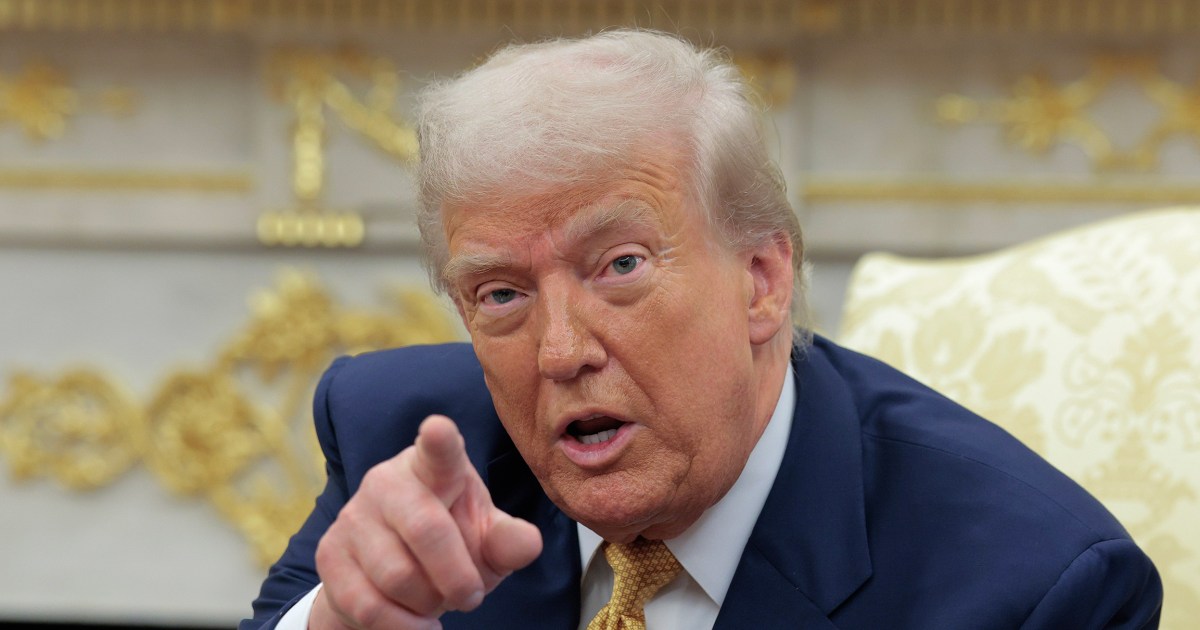
WASHINGTON — President Donald Trump on Thursday signed an executive order prohibiting “third party, pay-for-play” payments to college athletes, a move the White House is taking to curb “bidding wars” that have roiled college sports in recent years.
The order, a fact sheet that was shared in advance with NBC News by a White House official, notes that recent court rulings have dismantled the NCAA’s transfer and recruiting rules and “created a chaotic environment that threatens the financial and structural viability of college athletics.”
The order could send shockwaves through college football and men’s basketball, where player recruitment in the so-called transfer portal has become a multimillion-dollar market in recent years, with top teams spending tens of millions to fill out rosters.
The order would not apply to fair-market compensation for athletes who make brand endorsements, according to the White House.
The order also looks to protect women’s and nonrevenue sports by mandating that revenue sharing between universities and college athletes be implemented in a manner that protects those programs.
The president’s order also notes that a patchwork of laws in 30 states have contributed to competitive imbalances in sports.
It was not immediately clear how the proposed order would be enforced, or what mechanisms were in place to ensure revenue is shared more equitably between men’s and women’s and nonrevenue-generating sports.
This is a developing story. Please check back for updates.
NIL
Trump Signs Executive Order on College Sports Pay
Trump Signs Executive Order on College Sports Pay Privacy Manager Link 0

NIL
Trump signs executive order to rein in ‘chaotic’ influence of money on college sports | College sports
Donald Trump on Thursday signed an executive order prohibiting “third-party, pay-for-play” payments to college athletes, a move the White House says is intended to curb the booster-funded bidding wars that have upended the landscape of college sports in recent years. The order asserts that recent court rulings and a patchwork of conflicting state laws have […]

Donald Trump on Thursday signed an executive order prohibiting “third-party, pay-for-play” payments to college athletes, a move the White House says is intended to curb the booster-funded bidding wars that have upended the landscape of college sports in recent years.
The order asserts that recent court rulings and a patchwork of conflicting state laws have dismantled long-standing NCAA rules, creating what it describes as a “chaotic environment” that threatens the financial stability and competitive balance of collegiate athletics.
It marks the most aggressive federal intervention yet in response to the rapid commercialization of college sports, particularly in football and men’s basketball, where top programs now spend tens of millions of dollars to attract and retain athletes through name, image and likeness (NIL) deals.
Under the new directive, schools would be expected to eliminate any third-party NIL payments used as recruiting inducements, while still allowing fair-market compensation for legitimate services such as brand endorsements.
The order also seeks to protect women’s and non-revenue sports, directing athletic departments to preserve – and in some cases expand – scholarship opportunities and roster spots in programs that don’t generate significant revenue. Starting with the 2025–26 academic year, schools with more than $125m in athletic revenue are urged to increase their investment in non-revenue sports, while schools with $50m or more are required to maintain existing levels.
The president’s order points to growing disparities fueled by state-level legislation, including the more than 30 states that have passed NIL laws, and warns that the resulting imbalance has created an “oligarchy” of wealthier programs that can simply outbid rivals for the best players. It also cites rising concerns that runaway NIL spending is draining resources from Olympic and educational sports that form the foundation of America’s athletic system.
“Absent guardrails to stop the madness,” the order reads, “many college sports will soon cease to exist.”
In addition to targeting NIL abuses, the executive order:
-
Calls on the Department of Education, the FTC, and the Department of Justice to develop enforcement and regulatory plans within 30 days
-
Directs the Department of Labor and National Labor Relations Board to clarify the employment status of student-athletes in ways that prioritize educational benefits
-
Instructs federal agencies to use Title IX enforcement, funding decisions, and litigation strategy to protect the long-term viability of college athletics
-
Encourages collaboration with Congress and state governments to advance a national framework
The order highlights the outsized role that college athletics play in US Olympic success, noting that 75% of athletes on the 2024 Olympic team were current or former collegiate athletes, and argues that preserving a broad base of non-revenue sports is essential to maintaining America’s international dominance.
While the order outlines sweeping federal priorities, it remains unclear how many of its provisions will be implemented in practice, particularly in the absence of new legislation. Still, the White House insists the move is necessary to restore fairness and stability to a system that it describes as “drifting toward professionalization”.
“College sports are not, and should not be, professional sports,” the order declares. “A national solution is urgently needed before it’s too late.”
NIL
President Donald Trump signs executive order relating to college sports
President Donald Trump signed an executive order on Thursday that will prohibit third-party, pay-for-play payments and directs the Secretary of Labor and the National Labor Relations Board to clarify that athletes are amateurs and not employees, the White House announced. Titled “Save College Sports,” the executive order delivers on multiple items the NCAA has recently […]

President Donald Trump signed an executive order on Thursday that will prohibit third-party, pay-for-play payments and directs the Secretary of Labor and the National Labor Relations Board to clarify that athletes are amateurs and not employees, the White House announced. Titled “Save College Sports,” the executive order delivers on multiple items the NCAA has recently lobbied Congress for.
The NCAA and Power Five leaders have long pursued Congressional action on Capitol Hill, most recently with the introduction of the SCORE Act in the House. The executive order prohibits third-party, pay-for-play payments but “does not apply to legitimate, fair-market-value compensation that a third party provides to an athlete, such as for a brand endorsement,” according to the White House’s release. It is unknown what entity will have the authority to enforce the prohibition of third-party, pay-for-play payments included in Trump’s executive order.
An executive order streamlines some of the top items on the NCAA’s wishlist. The order “requires the preservation and, where possible, expansion of opportunities for scholarships and collegiate athletic competition in women’s and non-revenue sports.”
“The NCAA is making positive changes for student-athletes and confronting many challenges facing college sports by mandating health and wellness benefits and guaranteeing scholarships, but there are some threats to college sports that federal legislation can effectively address and the Association is advocating with student-athletes and their schools for a bipartisan solution with Congress and the Administration,” NCAA president Charlie Baker said in a statement.
“The Association appreciates the Trump Administration’s focus on the life-changing opportunities college sports provides millions of young people and we look forward to working with student-athletes, a bipartisan coalition in Congress and the Trump Administration to enhance college sports for years to come.”
The House v. NCAA settlement was officially approved last month, paving the way for institutions to share revenue directly with athletes and pay nearly $2.8 billion in backpay. Through the settlement, the NCAA and power conferences to create the newly-established enforcement arm, College Sports Commission.
House plaintiff attorneys reportedly reached a deal with the power conferences and NCAA officials earlier this week to treat collectives or any “school-associated entity” in a similar fashion as other businesses when determining the legitimacy of third-party NIL deals submitted to the CSC’s NIL Go clearinghouse.
“Within 30 days of the date of this order, the Secretary of Education, in consultation with the Attorney General, the Secretary of Health and Human Services, the Secretary of Education, and the Chairman of the Federal Trade Commission, shall develop a plan to advance the policies set forth in subsections (a)-(c) of this section through all available and appropriate regulatory, enforcement, and litigation mechanisms, including Federal funding decisions, enforcement of Title IX of the Education Amendments Act of 1972, prohibiting unconstitutional actions by States to regulate interstate commerce, and enforcement of other constitutional and statutory protections, and by working with the Congress and State governments, as appropriate,” the order states.
The NCAA has lobbied Congress for an antitrust exemption and state preemption, which President Donald Trump’s executive order does not address. Sources previously speculated to On3 that an executive order from Trump could include language barring athletes from being classified as employees. The National Labor Relations Board’s general counsel rescinded a Biden-administration memorandum in February. The Biden-era memo from the previous NLRB general counsel stated they viewed college athletes as employees of their institutions under the National Labor Relations Act.
Co-sponsors of the SCORE Act include seven Republicans and two Democrats, which gives the bill a fair chance of passage in the House. It would need at least seven Democratic votes in the Senate, where its chances are viewed as slim. The SCORE Act was successfully marked up by two committees in the House on Wednesday and was on track to be introduced following the summer recess.
“The President clearly has an interest in sports, big picture, has an interest in college sports,” SEC commissioner Greg Sankey said last week. “He’s been at our games. The notion of an executive order has been mentioned before. There were some reports of a commission or an executive order back to like, April, I think, is when that started to bubble. So we’ll wait and see.”
-

 College Sports2 weeks ago
College Sports2 weeks agoWhy a rising mid-major power with an NCAA Tournament team opted out of revenue-sharing — and advertised it
-

 Sports2 weeks ago
Sports2 weeks agoNew 'Bosch' spin
-

 Fashion1 week ago
Fashion1 week agoEA Sports College Football 26 review – They got us in the first half, not gonna lie
-
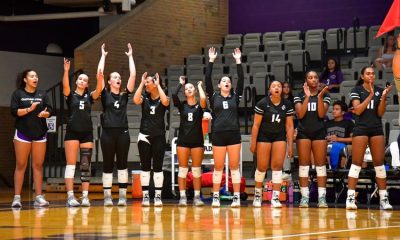
 Sports1 week ago
Sports1 week agoVolleyball Releases 2025 Schedule – Niagara University Athletics
-

 College Sports3 weeks ago
College Sports3 weeks agoMSU Hockey News – The Only Colors
-

 Sports3 weeks ago
Sports3 weeks agoE.l.f Cosmetics Builds Sports Marketing Game Plan Toward Bigger Goals
-

 Health1 week ago
Health1 week agoCAREGD Trademark Hits the Streets for Mental Health Month
-

 College Sports2 weeks ago
College Sports2 weeks agoBuford DB Tyriq Green Commits to Georgia
-
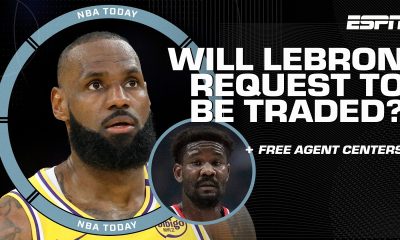
 Youtube2 weeks ago
Youtube2 weeks agoWill LeBron James request a trade? 🤔 Windy says MULTIPLE TEAMS would make offers 👀 | NBA Today
-
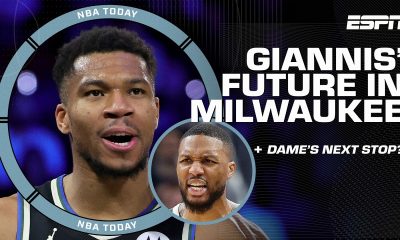
 Youtube2 weeks ago
Youtube2 weeks agoWill Giannis DEPART Milwaukee⁉️ + How signing Turner & waiving Dame impacts the Bucks | NBA Today





























